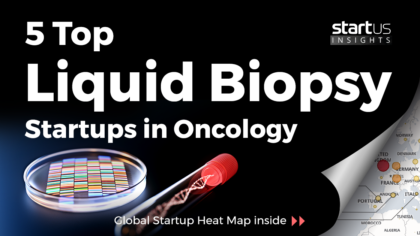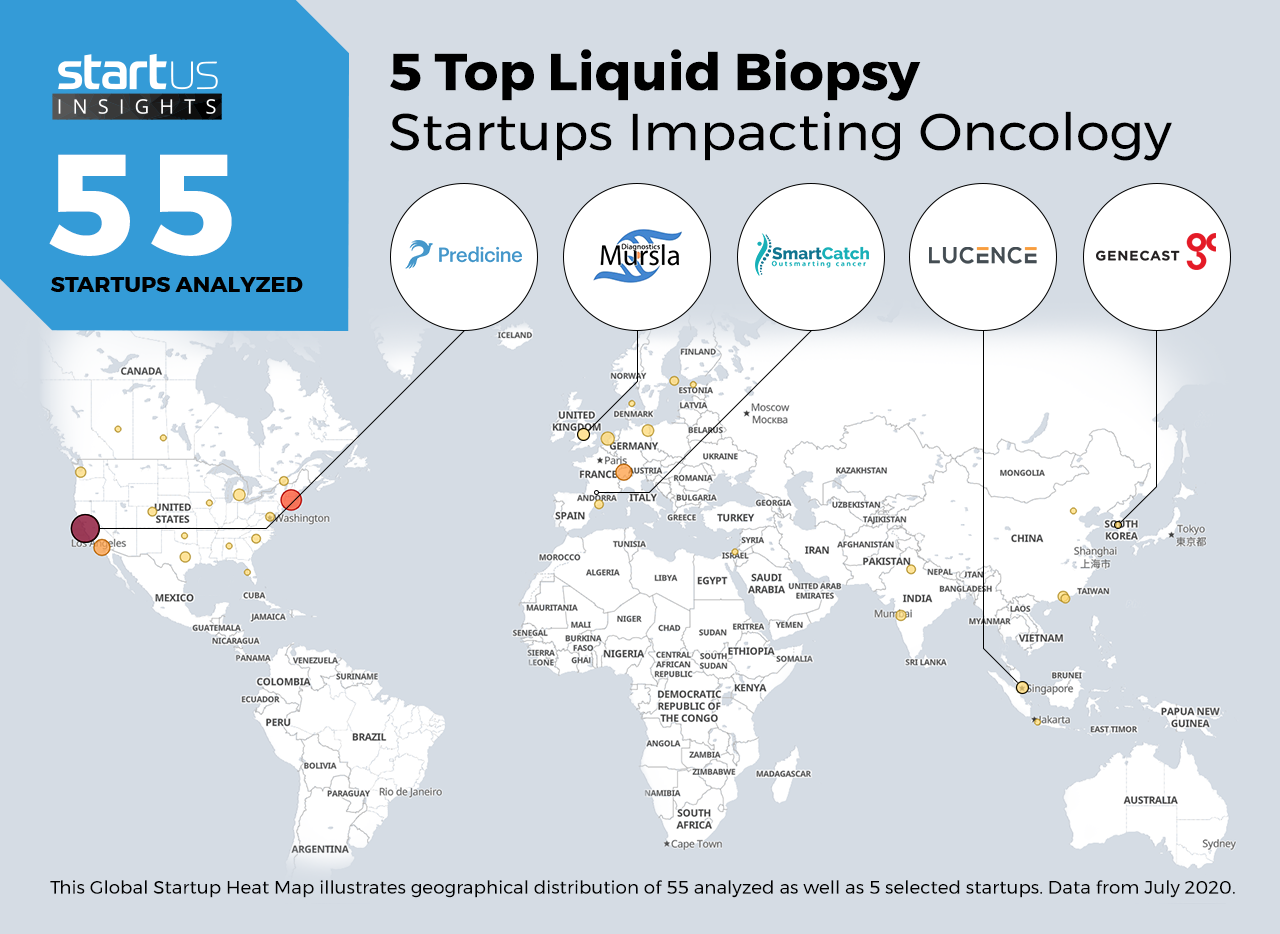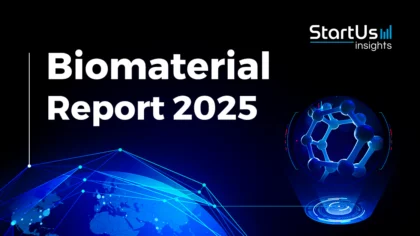Our Innovation Analysts recently looked into emerging technologies and up-and-coming startups working on solutions for the healthcare sector. As there is a large number of startups working on a wide variety of solutions, we want to share our insights with you. This time, we are taking a look at 5 promising liquid biopsy startups.
Heat Map: 5 Top Liquid Biopsy Startups
Using our StartUs Insights Platform, covering 1.116.000+ startups & emerging companies, we looked at innovation in the field of healthcare. For this research, we identified 55 relevant solutions and picked 5 to showcase below. These companies were chosen based on a data-driven startup scouting approach, taking into account factors such as location, founding year, and technology among others. Depending on your specific criteria, the top picks might look entirely different.
The Global Startup Heat Map below highlights 5 startups & emerging companies developing innovative oncological liquid biopsy solutions. Moreover, the Heat Map reveals regions that observe a high startup activity and illustrates the geographic distribution of all 55 companies we analyzed for this specific topic.
Mursla – Exosome Quantum Sensing
Liquid biopsy makes use of several biomarkers for diagnosing conditions. Specifically, the exploration of biomarkers such as exosomes is an avenue for liquid biopsy startups to develop innovative solutions. Tumor-derived exosomes, for example, are found to facilitate tumor growth and metastasis.
UK-based startup Mursla presents NPQuantumSense, an on-chip platform for non-invasive detection of cancer using cancer-specific exosomes circulating in the blood. This technology makes use of quantum phenomena in biofluids and is based on nanogap electrodes. Nanosensors are activated upon the trapping of target biomarkers such as exosomes.
Lucence – Circulating Tumor DNA
The circulating tumor DNA (ctDNA) present in the bloodstream is an important biomarker for cancer diagnosis and prognosis. This circulating DNA originates either from tumors or from tumor cells that are circulating in the blood. Moreover, after the break up of dead tumor cells, there is a possibility of ctDNA to get released into blood vessels.
Singapore-based startup Lucence builds AmpliMARK, a proprietary amplicon-based sequencing technology that detects both cancer-causing genes and viruses. With the help of signal amplification, the startup is able to accurately pinpoint cancer cells and genomic alterations in cancer. Analyzing the ctDNA enables the identification of mutations in cancerous tumors and helps deliver personalized cancer treatments.
SmartCatch – Circulating Tumor Cells (CTC) Capture
The accuracy and specificity of diagnostic tests largely depend on the number of biomarkers present in bodily fluids. Liquid biopsy biomarkers such as CTCs are present in the order of 1–10 CTCs in 5ml of blood making it difficult to diagnose cancer early – a challenge that costs millions of lives annually.
French startup SmartCatch provides a CTC capture device, specializing in size and deformability. This device enables a single-step physical entrapment of CTCs without sample preparation. As a result, there is minimal loss of clinically relevant information in the liquid biopsy.
Predicine – Circulating Free DNA & RNA
Circulating free DNA (cfDNA) and RNA (cfRNA) in body fluids such as blood or urine aids in the comprehensive profiling of cancer. The progression of cancer at DNA and RNA level makes the analysis of cfDNA and cfRNA necessary for a holistic understanding of the disease.
US-based startup Predicine develops GeneRADAR, a patented liquid biopsy test for cancer detection at early stages, disease monitoring, and residual disease assessment. Their technology detects cfDNA and cfRNA biomarkers for understanding the genomic profile and functional biology of the disease better.
GENECAST – High Detection Sensitivity
The early detection of cancer is the key to reducing the mortality rate of this disease. To tackle this challenge, startups are not only focussing on various kinds of new cancer biomarkers but also on increasing the sensitivity of already known liquid biopsy tests.
South Korean startup GENECAST works on Allele-Discriminating Priming System (ADPS), a proprietary technology with a maximum detection sensitivity of 0.0001%. The ADPS platform achieves this sensitivity through the selective amplification of ctDNA using the company’s engineered smart DNA polymerase.
What About The Other 50 Solutions?
While we believe data is key to creating insights it can be easy to be overwhelmed by it. Our ambition is to create a comprehensive overview and provide actionable innovation intelligence so you can achieve your goals faster. The 5 liquid biopsy startups showcased above are promising examples out of 55 we analyzed for this article. To identify the most relevant solutions based on your specific criteria, get in touch.










